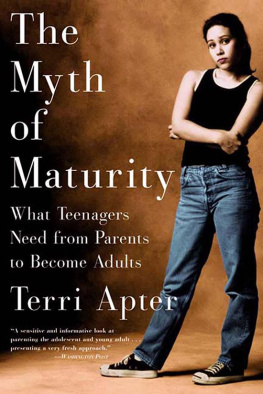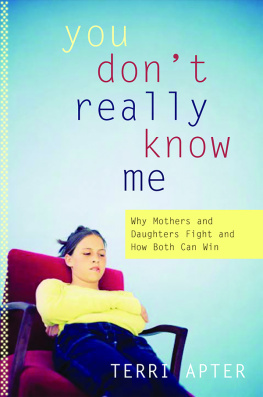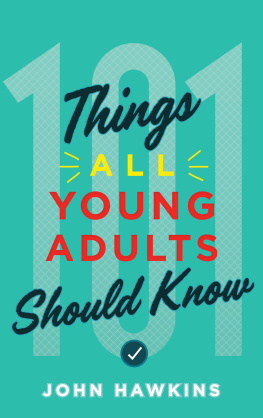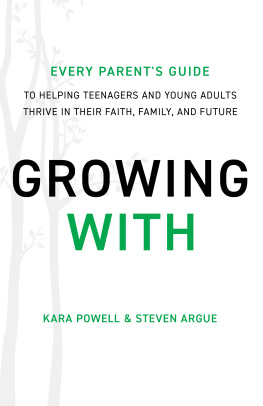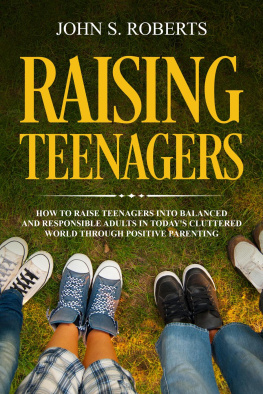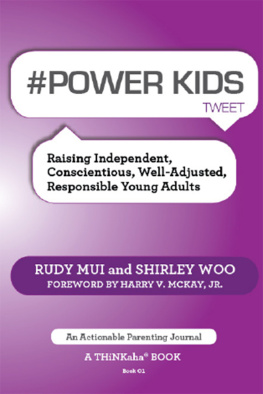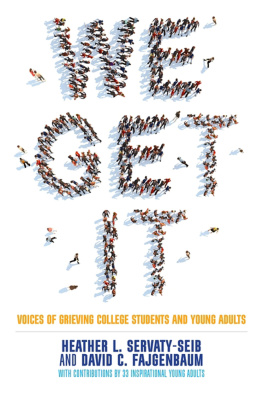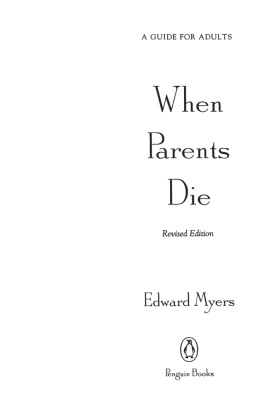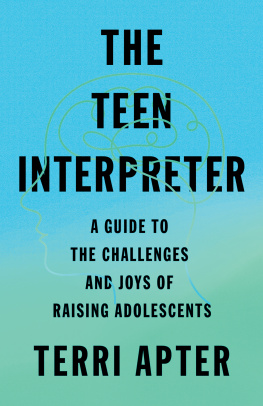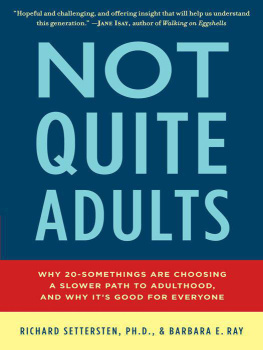

for Julia
and Miranda
THE MYTH
OF MATURITY
H ER situation couldnt have been better. At eighteen, she was starting college, having weathered the rough interviews and the rougher exams. She had come through, safe from disappointments, entitled to pride. As we packed and shopped for the things she would need as a college student, I felt a mothers thrill at a daughters adult potential: her whole life ahead of her!
She dragged her feet about packing. Only at the last moment did she make a real effort and begin checking off items on her list. But I was too excited on her behalf to register her mood. We made the short but tense journey in a gear-stuffed car on a perfect autumn day, clear and golden, full of promise. As I maneuvered into a small space in the crowded parking lot, I felt elated. The sun butted up against the yellow stone. Geraniums and old English roses were still in bloom. Even the earth beneath them glowed. I ached with excitement.
My rooms in the new court, my daughter announced. A cement block.
This is a lovely room! I exclaimed when we entered. It has a stunning view. For though her room was in a recent development, its large window looked out on the older courtyard. The room was larger than many in college residences I knew and was, in any case, her very own. Here her new, her very own life would begin.
Her little sister at once set off to explore. She sized up the shared kitchen and bathroom. She opened the cupboards and measured the drawers, then sat on the bed, her back against the wall, hugging her knees. I cant wait to go to college, she shivered with excitement, feeling the prospect of the best years hurtling toward herbut not fast enough. I know, I concurred. I wish I were going again, too. We felt full of fun, but I knew my older daughter was anxious to see us off, to establish herself in her grown-up world.
The car was now unloaded, and we were ready to leave. No. Wait. Okay. Go. This was familiar: a request made and then withdrawn as she decided, Whats the point? They wont understand. They wont be any use. I tried to pick up her meaning: Did she want help unpacking? Having told us, five minutes before, that she didnt was no indication of what she really wanted now. Okay, you can unpack, she allowed, but I decide where things go. Did she then want us to take her for lunch? I suggested. What a terrible idea. What she wanted, she now said, was for us to leave. But, in an uncharacteristic movement, she lifted her cheek to be kissed and didnt squirm away from my hug, but simply muttered a pride-saving, Yeah, yeah. (There she goes, doing her silly mother-thing.)
Doesnt she like her room? my younger daughter asked as we carried the now empty boxes and cases back to the car. Isnt she glad to be here? And then I focused on a question Id been pushing aside: Why wasnt she happy?
This was a strange puzzle, given Id had my own experience of college and given, further, that I deal day-to-day with problems my own college students bring to me. Id had a similar leave-taking twenty-five years before. As I moved into the dorm in Chicago, when I was the age my daughter is now, I expected that I would be stepping out of my ill-fitting and unbecoming adolescence. Waiting for me in my new life, I supposed, was a sharp set of adult clothes. Yet when I arrived, I felt naked, helpless, terrified. Everyone else moving in had what I lacked: assurance, flair, personality. My fathers presence made a bad situation worse. He spoke too loudly, breathed too loudly, looked silly when he carried my cases, all flushed and anxious. When, awkward and friendly, he spoke to another young woman on my corridor, trying to establish an acquaintance on my behalf, I felt branded by my association with him: Thats it, I thought, thats that relationship ruined. I wanted to be free of him, but when he left, I felt abandoned.
There I was, left to start my own life, on my own terms, with my brand-new checkbook, blank notebooks, and a clean social slate. I marked all these with the utmost clumsiness, making mistakes I still blush at, striking poses that everyone (but me) could see through, and lurched toward goals that were either ill-conceived or utterly unrealistic. My mistakes were now my very own, and I had to handle them alone. Any admission of needing my parents or failure to obtain the prize ribbons of happiness would be an admission of shameful immaturity. Youre behaving like a child, could sting me to silence. How adolescent! would force me back into my mature facade. Grow up! was like a slap, leaving me shamed, because it declared that I was not as I was supposed to be. Like good parents, mine believed that independence was good for me. Now, they fervently believed, I should be standing on my own two feet. Trying to do the right thing, they wanted to let go. If I found myself in free fall, then I just didnt have what it takes.
Each day I try to reassure myself that my daughter will not have the tough time I did and that her declaration that she is doing fine is genuinenot the false bravado I felt compelled to display to my parents. Like most parents, I feel caught between my daughters need to find her own way into adulthood and her equally strong need to remain connected to her family. As I try to calm myself with self-soothing words (Shes doing fine. Shell be okay.) there lurks an awareness of how difficult this earlythis too earlyphase of adulthood is.
The years bridging adolescence and adulthood are a testing ground for all the assumptions we have about ourselves. Every young person confronts a series of challenging questions: How will I manage as one of themone of the grown-ups? How do I measure up in a larger world-pond? Will I be able to learn what I need to know? Who will be my friends? Wanting to go forward, many young people feel as clumsy and needy as a toddler.
When parents fail to understand the mechanisms and pressures of this phase, they are at a loss as to what a daughteror sonneeds when she says, I have no future or Theres nothing to look forward to. All too often, we fail to work alongside young people to address their doubts. Instead of being the safe containers for a young persons anxieties, parents, teachers, and employers often have a tin ear when it comes to hearing cries for help. However much they want to understand, advise, and support, parents stand as confused witnesses to such turmoil: Shes twenty-two, and I have more interrupted nights than I did when she was two, Faye said of her daughter. She wakes up crying and needs me to hold her and talk to her. Her daughter Christa explained: Ive kept on track, Ive done well at school, but now I just cant focus. Everyone expects me to glide off smoothly into a good life, but I cant even see what a good life would belet alone decide how to go about it. The long road to maturity exposes young people to grave anxietiesespecially in a culture that values independence so highly.
EXPECTATIONS ARISING FROM THE MYTH OF MATURITY
There is a common saying that when childhood and adolescence come to an end, life begins. No longer bound by our roles as children, no longer legally under a parents control, we come of age, independent, responsible, and free. It is now time to be our own person, keep our own hours, do our own thing, free from parents demands, but not yet burdened by adult responsibilities. At the threshold to adulthood, promise and reality come together. We test our abilities, yet our mistakes are forgiven. Novice adults have the best of everything: youth and independence, confidence and challenge, opportunity and choice. The common image is of a bird stretching its wings and flying from the nest like a pro.
Next page
